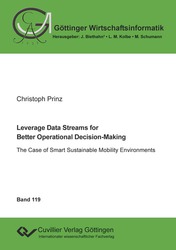| Areas | |
|---|---|
| Serie de libros (97) |
1382
|
| Nachhaltigkeit |
3
|
| Gesundheitswesen |
1
|
| Letra |
2376
|
| Medienwissenschaften | 16 |
| Teología | 57 |
| Filosofía | 102 |
| Derecho | 424 |
| Economía | 855 |
| Ciencias sociales | 417 |
| Ciencias del deporte | 48 |
| Psicología | 233 |
| Educación | 190 |
| Historia | 183 |
| Arte | 111 |
| Ciencias culturales | 166 |
| Literatur | 117 |
| Lingüística | 89 |
| Ciencias Naturales |
5408
|
| Ciencias Ingeniería |
1798
|
| General |
98
|
|
Leitlinien Unfallchirurgie
5. Auflage bestellen |
|
Erweiterte Suche
Leverage Data Streams for Better Operational Decision-Making (Volumen 119) (Tienda española)
The Case of Smart Sustainable Mobility Environments
Christoph Prinz (Autor)Previo
Lectura de prueba, PDF (210 KB)
Indice, PDF (130 KB)
Smart sustainable mobility ecosystems promise to address society’s expectation of environmentally friendly on-demand mobility. While the technology stack to build such ecosystems is just around the corner in the form of connected, automated, and electric vehicles, strategies to deploy and operate such fleets in a coordinated manner must still be advanced.
Most of such optimization challenges highly depend on the nature of customer demand, vehicle supply, and environmental influences. Hence, this dissertation investigates how available data streams from mobility ecosystems can be leveraged in Information Systems to solve related decision problems. The overarching goal of this work is to generate design knowledge to improve vehicle availability, provider profitability, and environmental sustainability for such ecosystems. Applying quantitative methods to real-world data from shared vehicle systems generates insights into the nature of demand and supply. Combining it with an analysis of empirical research on vehicle relocation algorithms builds the foundation for two artifact designs. The first artifact enables the development and simulation-based evaluation of operation modes for vehicle fleets. The second artifact enables artificial intelligence-based decision support for the vehicle rebalancing problem.
The insights are finally incorporated and generalized to a nascent design theory on data-enabled operational decision-making in the context of smart sustainable mobility environments. The findings have multifaceted implications for researchers concerned with data-enabled value creation in Green IS, shared economy and smart mobility, and business analytics and data science. Furthermore, guidance for fleet providers to improve system attractiveness and for society to experience the potential amount of vehicle access without personal ownership is provided.
| ISBN-13 (Impresion) | 9783736978027 |
| ISBN-13 (E-Book) | 9783736968028 |
| Formato | A5 |
| Idioma | Inglés |
| Numero de paginas | 234 |
| Laminacion de la cubierta | Brillante |
| Edicion | 1. |
| Serie | Göttinger Wirtschaftsinformatik |
| Volumen | 119 |
| Lugar de publicacion | Göttingen |
| Lugar de la disertacion | Göttingen |
| Fecha de publicacion | 31.05.2023 |
| Clasificacion simple | Tesis doctoral |
| Area |
Economía
|
| Palabras claves | Smart Mobility, Design Science Research, Machine Learning, Carsharing, Vehicle Relocations, Shared Economy, Fahrzeugverlagerungen, Intelligente Mobilität, Designwissenschaftliche Forschung, maschinelles Lernen |








